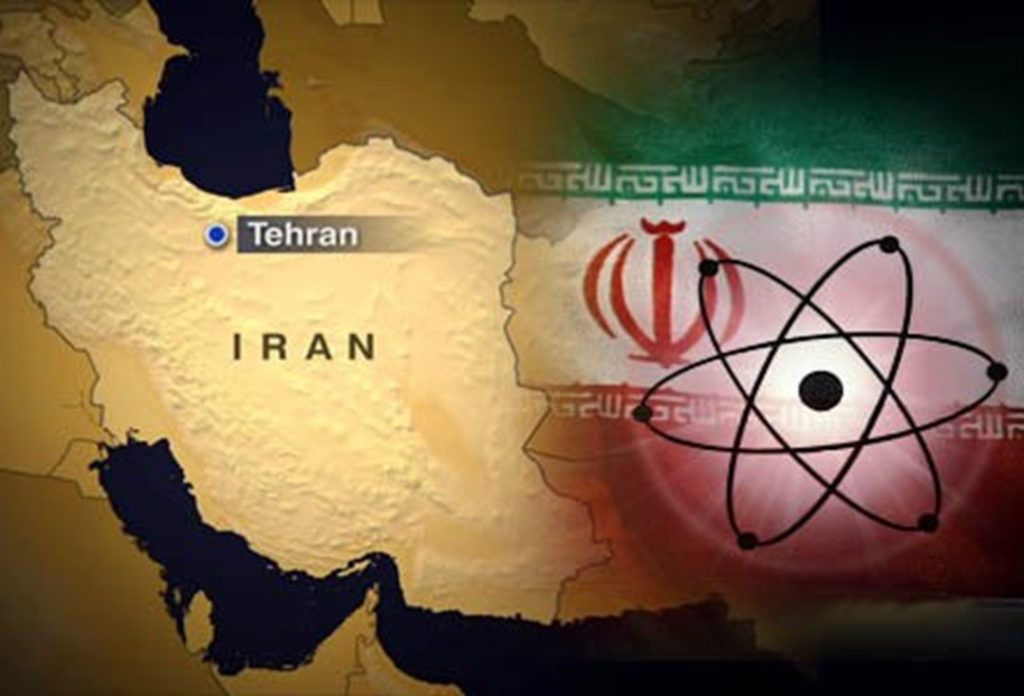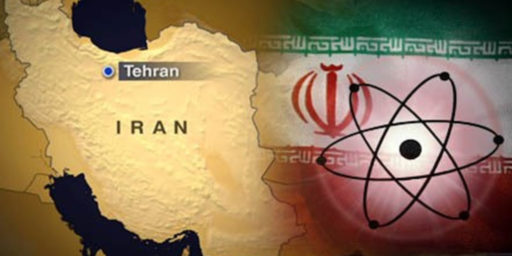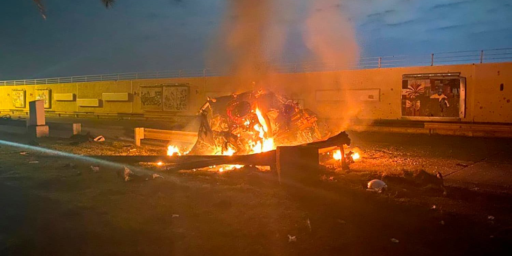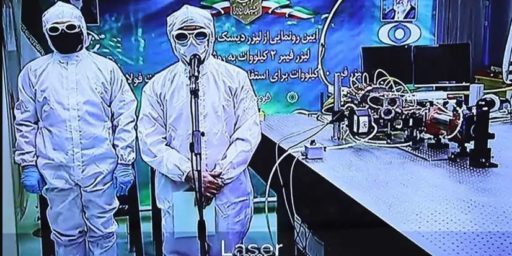Israeli Bomb Sets Back Iranian Nuclear Program
The Natanz fuel enrichment site has been seriously damaged.

Interesting and surprising news from the New York Times (“Iran Admits Serious Damage to Natanz Nuclear Site, Setting Back Program“):
A fire at Iran’s main nuclear fuel enrichment site caused significant damage, setting back the country’s nuclear program by months, the government acknowledged on Sunday, after initially saying the destruction was minor.
A Middle Eastern intelligence official with knowledge of the episode said Israel was responsible for the attack on the Natanz nuclear complex on Thursday, using a powerful bomb. A member of the Islamic Revolutionary Guards Corps who was briefed on the matter also said an explosive was used.
Both officials spoke on condition of anonymity when discussing sensitive intelligence and operational topics.
Suspicion in Iran has focused on Israel and the United States, which have sabotaged the nuclear program in the past and have vowed to keep Iran from developing nuclear weapons. In the past, Israel and the United States have used cyberattacks to damage Iran’s nuclear program, but that has been ruled out as a cause in this case, the Revolutionary Guards member said.
Though there was no way to verify its involvement independently, Israel’s intelligence network has shown its ability to strike in the heart of Iran, breaking into a warehouse in Tehran in 2018 and stealing half a ton of secret records documenting Iran’s nuclear project and spiriting them out of the country. Many of these records were given by Mossad, the Israeli spy agency, to the International Atomic Energy Agency, with many new clues of where Iran might be hiding forbidden equipment and raw material.
If the damage at Natanz was an attack by a foreign power, it reinforces Iran’s vulnerability as its economy is strangled by sanctions imposed by a hostile Trump administration and its population is ravaged by the Covid-19 pandemic.
This would seem to be unalloyed good news, as a nuclear-armed Iran is a nightmare for the region.
One wonders when and how Iran will retaliate. Thus far, its reprisal for the US assassination of Quds Force commander Qassem Soleimani has been limited to relatively limited strikes on US forces in Iraq.
Sam Dagher warned that more would be forthcoming:
Over time, the United States, Israel, and their allies—and all those perceived as harming Iran’s regional strategy—will face retribution, though, most likely in the form of covert operations and actions that will be much harder to trace back to Tehran. It would, in a way, be back to basics: bombings, assassinations, and stealth tactics long attributed to Mughniyeh. Indeed, Soleimani himself touted such efforts both at the memorial service for Mughniyeh and in a rare TV interview he gave in October. As Soleimani put it, it is the technique of “appearing like a sword and disappearing like a ghost.” It’s as if he were instructing his soldiers on the path they would have to take after his demise.
During the memorial for Soleimani, Nasrallah vowed to avenge his comrade’s killing by driving U.S. troops from the region and returning them to America “in coffins,” echoing the vow Soleimani made in 2018 to avenge Mughniyeh by “eradicating” Israel. Hezbollah will not shy away from carrying out operations against the U.S. and its allies, and may even resort to the campaign of assassinations and bombings that it turned to in Lebanon starting in 2005, when it felt under siege and compelled to defend its existence.
Elsewhere, having reconciled with Hamas after the two sides fell out over Iran’s support for Assad, Tehran could turn to the group to ratchet up confrontation with Israel in Gaza. In Syria, both Iran and Hezbollah will seek to maintain their presence and influence—Assad, for one, knows his survival hinges on patronage from Iran and Russia; Tehran, meanwhile, sees Syria as the second-most-important country in its axis of resistance, after Iran itself. And in Iraq, Iran’s proxy militias “have the wherewithal and expertise to escalate the situation and deliver painful blows to the U.S.,” Hashimi told me. There, too, he said, the focus will be on mobilizing assassination squads and mounting other special operations, rather than on carrying out conventional attacks on American forces.
So much has happened since that the .Soleimani killing seems like years rather than a mere six months ago.
For now, a weakened Iran is something to celebrate. If nothing else, it lessens the chances that an erratic US President will do something foolish between now and the November elections. But the setback is only temporary and the longer-term consequences unknowable.
One hopes a Biden administration will be in place a little more than six months from now to put the nuclear deal back in place and then work on improved inspection regimes.






And why do we need the nuclear treaty back?
Because the JCPOA was just too peaceable.
@OzarkHillbilly:
Alas, Trump withdrew us from the agreement and Iran, not surprisingly, stopped complying with its end.
It is interesting how Iran is so porous to physical intrusion by its enemies. Even stuxnet is alleged to have been inserted into the relevant network through the use of a physical medium.
North Korea shows us that an economy much smaller than Iran can produce nukes. The long term effects of bombing seem unable to retard production for long; the Ploesti bombings did little to slow oil production. The Israeli-Saudi-US alliance may be vulnerable to instability in the House of Saud and erosion of support for Israel by the American public. Maybe slowing down the Iranian acquisition by six months is worth it, but soon we will have to address a nuclear Iran that has a different perspective on the killing of Soleimani.
@James Joyner: Of course they did, but not before rump reimposed sanctions on them, and Europe did nothing about the sanctions.
It has long been my contention that Iran, in the long run, is a more suitable partner for the US than the Saudis or Gulf countries. Their people are far more educated and sophisticated than any of the Arab neighbors. Our hardline stances, driven by evangelical Christians, have created the hardline backlash in Iran. To our detriment.
We started that shift to Iran under Obama but then Trump and the fanatical, Christian right took over. Why we keep supporting the Saudis any more is beyond me. We don’t need their oil. They regularly go against our interests (such as flooding the oil market). They support terrorists around the world. I don’t get it.
@Scott: The Saudis spread cash around to the right political campaigns and have major stakes in key companies to ensure US politicians think twice about applying any pressure to them. They are running a lite-version of the Chinese model of soft influence. Unfortunately—everything in this Country is for sale [sans Black Equality] Foreign policy is not different. The displacement camps from the ISIS caliphate are a global tragedy–no one (with any power) cares.
You are correct however, we had the preferred partner in Iran to get the M.E. unscrewed and keep it stable. We then pissed that away because we don’t seem to like Democracy when it leads to choices not in line with the financial fortunes of our multi-national corporations. Now we are stuck allied with Arabs, who have values that do not enable becoming a regional power. They would like nothing more than to write the US a check have have US troops garrisoned across their country–they don’t want to do any work themselves though. You only have to look at Saudi military operations in Yemen–compared to Iranian military operations which are very organized however limited because of years of sanctions. They would eat the Saudi’s lunch if the US withdrew for the M.E.
I just want to make sure I have this right: A military attack on a sovereign nation absent a declaration of war is unalloyed good news, but the removal of a statue is a vicious act of terrorism. Is that this week’s thinking?
@wr: Iran’s nuclear program is in defiance of a dozen UN Security Council resolutions going back many years. Setting it back is good news. And Iranian proxies have been committing acts of war against Israel since near the foundation of the Islamic Republic.
@Jim Brown 32:
Reminds me of the old joke that the Saudi Armed Forces Anthem is “Onward, Christian Soldiers”
Simple question- why can Israel have the bomb and not Iran or Saudi Arabia (which appears to be trying).
@Raoul: bc Iran has threatened to use it for genocide against the Jews. Israel a tiny nation has it to repel just such a threat.
@James Joyner:
Is this terrorism per your argument on the Columbus statue thread?
It is property owned by Iran.
@James Joyner: I’m sorry, but the only distinction I can see in your posts between “terrorism” and “unalloyed good” is that you approve of the people doing the latter and disapprove of those committing the former.
I accept that there is a wide gap between US law and International Law. I’ll start believing in International Law when it starts to have a real-world effect. When it takes 25 years to get indictments for war crimes out of the Hague, how am I going to take that seriously?
If the Iranians are going to try for a bomb, the Israelis are going to try and stop them. International Law between those two is utterly irrelevant.
@Raoul:
Israel denies possession of the bomb, but it’s long been an open secret that they have it. Having it would be in clear violation of the NPT but, once one has it, it’s essentially a fair accompli.
@de stijl:
@wr:
“Terrorism” isn’t a play here: we’re talking covert state action against another state. Depending on how one wants to frame it, it’s “espionage,” an “act of war,” or (potentially, but likely not) a “war crime.” States, by definition, can’t commit terrorism (although they can support terrorist proxies, as Iran does with Hezbollah).
Beyond that, the use of force is typically the only way one state can enforce its will on another. In domestic law—and particularly in democratic states like ours—it’s simply not a legitimate means of resolving political grievances.
@Michael Reynolds:
Pretty much. The only thing that enforces “international law” is good will and the fear of reprisals from other states. Thus, powerful states tend to follow it because it costs them little and weak states tend to follow it because they’re forced to.
@James Joyner:
If it is a state action it isn’t terrorism?
@de stijl:
That’s by far the predominant view in international relations and international law circles, although there are dissenters. Basically, state actors as state actors are subject to a different set of rules than are private citizens.
@Scott: Seems fair to point out that basing U.S. troops in Saudi Arabia was what gave Bin Laden a ‘causus belli’.
@Albert: How do you feel about what the Israel state is doing to the
Palestinians? Saudi Arabia has not stated they want to obliterate the Israel state- should they get nukes? Finally, isn’t a MAD approach viable in the Middle East? I just don’t see the Israeli position to be beyond reproach.
@James Joyner:
We view and process things in really different ways. It is pretty fascinating.
I know you to be a good person with a good heart and not a bad faith arguer.
When we disagree, I pay attention.
You entirely missed my point. You literally argued against yourself yesterday on statues of all the foolish hills to die on.
@de stijl: I think you’re crossing threads here. My response to your question here is different than my response to the question there because international law and domestic law uses ‘terrorism’ differently for perfectly valid reasons. (States are presumed sovereign and to have the sole custody of the legitimate use of violence.)
@James Joyner:
You are very institutionally oriented and accept things as formally correct that I deem bonkers.
I like interacting with you. You perplex me often.
If tossing a Columbus statue in a river is terrorism what would you call what Israel did to Iran? Are there no principles that apply across both actions?
@de stijl: I honestly don’t know how many times I can answer the same question using different words. State vs state has, going back at least to the 1648 Treaty of Westphalia, has simply operated on a different set of rules than citizen vs citizen in the same domestic jurisdiction. And for good reasons.
As a general rule, I don’t like Israel’s foreign policy and have thought Netanyahu a thug going back to his first tenure as PM. But states taking actions to protect the interests of their citizens are simply judged against different rules and we use different vocabularies.
Lots of countries, including the good guys, killed a lot of innocent civilians during WWII. Our atomic bombs mostly killed non-combatants. The purpose of doing so was to terrorize the civilian population and extract the surrender of their government. It worked.
But, to the extent Harry Truman are to be judged for wrongdoing, it’s for war crimes, not terrorism.
@James Joyner:
I am also flummoxed at your words.
You make a strong case for something I don’t acknowledge and ignore the application to internal dissent actions of which you do not approve.
I just do not get the distinction. Legalistic distinction vs moral distinction.
Tearing down a statue is terrorism. Burning down a nuclear plant is a police action. Tearing down a statue in Iraq is legit.
I really don’t get it.
I am not going to be dissuaded nor are you. This is a thing we’re going to disagree on.
As if the Iranians don’t realize that Israel already has nuclear weapons? Why would the Iranians commit a form of national suicide simply to nuke Israel?
@James Joyner:
Is crossing threads a gaffe? Unseemly?
Serious question.
If so, I did not know this.
The reality is that we sometimes need to blow things up and kill people in the interests of national security. No one likes it, but it is what it is. Earth is not a civilized place, there is no law, there is no law enforcement except what nation states do. I’d be happy to see a planet of laws, but that’s not reality and it won’t be any time soon.
Trump’s stupidity killed the JCPOA and so long as he’s in charge I’ll oppose any US military action. But he won’t be around for much longer, and we’ll still need to blow shit up.
Setting back Natanz is arguably a right choice. But it is inarguably property owned by others that someone vandalized. A thing that has differing operating principles.
Property has variable rights and privileges depending upon who owns it.
If by our neighbors in our land destruction of symbols is terrorism and criminally violent and or violently criminal, but destruction of another nation’s infrastructure is statecraft.
If Iran implanted a virus that shut down our power grid a la Stuxnet would that be realpolitik? Would it be justified? How would we react?
@James Joyner:
So when the Taliban hosted al Qaeda, and al Qaeda blew up the World Trade Center, was that not terrorism?
I don’t think “terrorism” is a useful word to describe anything, but it is a very useful word to elicit a knee-jerk response.
I seriously doubt Iran will be in the mood to negotiate with any U.S. administration.
@de stijl:
No, it’s just confusing. You were responding to a linked post saying that I hadn’t responded to something you hadn’t said on this thread. I finally figured out you were talking about a comment on a different thread.
@Gustopher:
We didn’t recognize the Taliban as the legitimate government of Afghanistan. Indeed, only Pakistan, Saudi Arabia, and the United Arab Emirates did. But, even if the legitimate government of Afghanistan was using al Qaeda as a proxy, al Qaeda is still a terrorist group and the 9/11 attacks were a terrorist act. Similarly, Hezbollah blowing up the Marine barracks in Lebanon at the behest of Iran was a terrorist attack. Our recourses and constraints against the two groups and the two countries are overlapping but distinct.
It’s marginally useful in various contexts but there are varying definitions at use even within the US Government. But I don’t find it problematic to acknowledge that states have different rights and responsiblities than private actors.